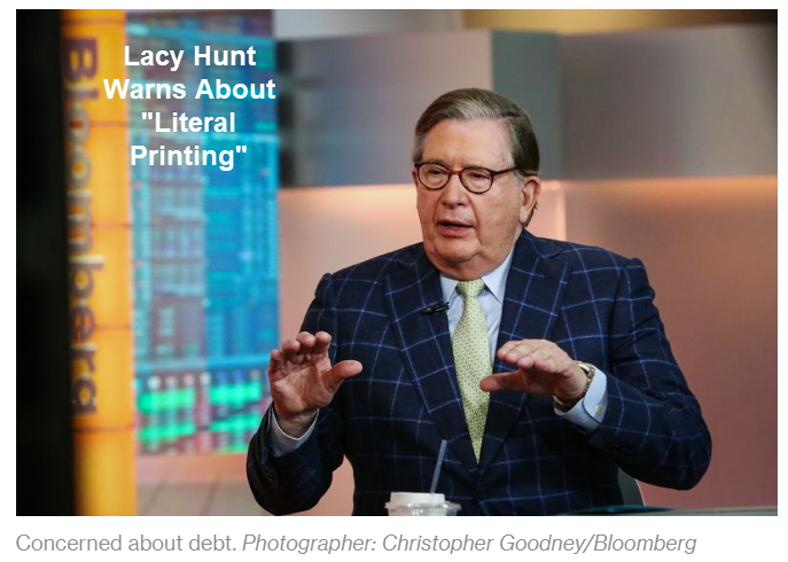Bond Bull Lacy Hunt Warns Of A Huge Monetary Risk
Tyler Durden
Wed, 08/19/2020 – 08:55
Authored by Mike Shedlock via MishTalk,
Lacy Hunt has not yet changed his mind on where bond yields are headed but he has his eyes on one thing that could change his mind.
Literal Printing Would Change the Game
Lacy Hunt at Hoisington Management has been a bond bull for three decades and accurately so.
If you are wondering what might change his mind, he explained in a Bloomberg Interview.
The first half hour of our discussion went about as expected. Even though the coronavirus pandemic has led to unprecedented Federal Reserve interventions and fiscal relief efforts, Hunt insisted it was mostly a continuation of what he’s seen for years.
Then, I asked about Modern Monetary Theory and other novel policy ideas, like direct monetary financing. That’s when his tone shifted to what he sees as a “great risk” in the years ahead.
Interview Snips
LH: When the Fed initiated QE1, QE2 and QE3, folks said those policies were very inflationary. There is a liquidity effect of what the Fed is doing, and the liquidity effect can be very powerful over the short term. But ultimately the increase in the money supply did not follow through after the rounds of Fed purchases of government securities because the banks couldn’t utilize the reserves, they didn’t have the capital base to make the loans, they had to charge a risk premium in an environment in which the risk premium was rising very dramatically and the borrowers couldn’t pay the risk premium. There was no secondary follow-through in terms of money supply growth, and the velocity of money fell and the growth rate fell back after a transitory rise. And I don’t really see this as any different.
LH: The first-round effects of the Fed look effective, and they’re widely hailed, but they make the economy even more overleveraged than it was before and credit is allocated to those who are not really in a position to generate economic growth from it. We’ve seen numerous similar programs in Japan and Europe and it looks like the central bank has the capability to do whatever it takes. They certainly have the ability to calm and reliquify markets, but those actions then compound the underlying problem, which is the extreme over-indebtedness. You get a transitory boost, you get a liquidity effect, but that liquidity effect runs out very quickly.
Bloomberg: This is usually the point at which I ask, how do we get out of this?
LH: The problem is people want a financial transaction to cover the problem. They want greater levels of debt — in other words, we’re going to try to solve an indebtedness problem by taking on more debt. Japan has tried many, many heroic measures to try to pull themselves out.
Bloomberg: Lastly, I want to ask you about the rise of Modern Monetary Theory within economics, and some proposals to have the Fed give money directly to individuals.
LH: The great risk is that we become dissatisfied with the way things are, and either de jure or de facto, the Federal Reserve’s liabilities are made legal tender. The Federal Reserve as it’s constituted today can lend but it cannot spend. Now, they’ve done some things that are different from what the Federal Reserve Act said under the exigent circumstances clauses, but so far they’re lending.
LH: There are folks who want to make the Fed’s liabilities legal tender. Now, if that happens, then the inflation rate would take off. However, in very short order, everyone would be totally miserable because no one would want to hold money. You would trigger Gresham’s Law — people would only want to hold commodities they can consume and commodities that can be traded for others.
LH: But there is that risk that you could use the Fed’s liabilities to pay directly. The Bank of England has made a small move in that direction — they say it’s temporary. There are others that want to try that because they’re frustrated with the fact that issuing the debt is not getting the job done. So we could significantly alter the whole structure of the U.S. economy. But if you use the Fed’s liabilities for directly funding goods and services, the consequences could be very extreme and very quick.
My Comments
I had a phone conversation with Lacy shortly after the Bank of England made that change, allegedly temporary, and another conversation in response to Hello. There is No Magic Money Multiplier.
Lacy agreed there is no magic multiplier and also directed me to the above interview.
I will add this caution: I have yet seen central bank changes that are temporary.
This concern is definitely something to keep an eye on.
via ZeroHedge News https://ift.tt/3hf4saK Tyler Durden
